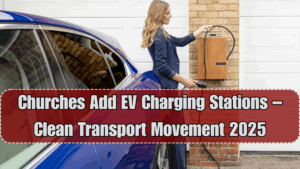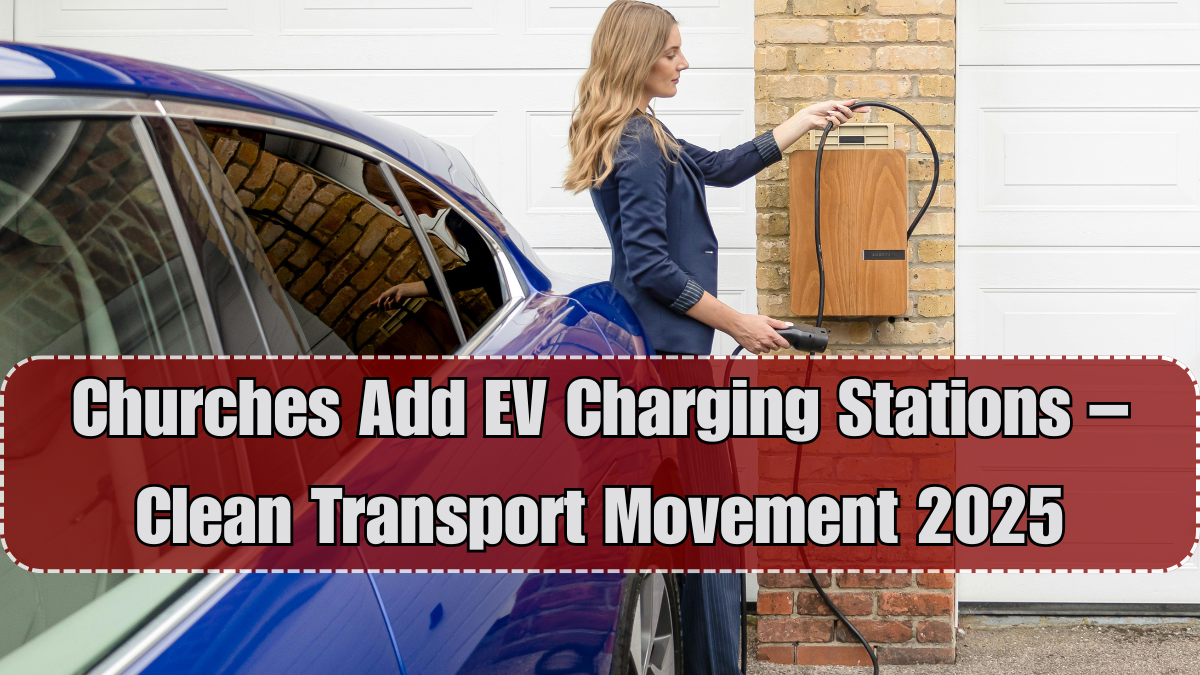The movement for EV Charging in Churches is now gaining nationwide momentum across both the United Kingdom and the United States. In 2025, several churches have taken an environmentally responsible step by installing electric vehicle (EV) charging stations in their parking areas. This bold step not only promotes sustainable transportation but also strengthens the role of religious institutions as community leaders in environmental protection.
By installing charging ports for worshippers, volunteers, and the surrounding neighborhood, these churches are actively supporting the green drive and addressing growing EV demand. Whether in rural parishes or urban cathedrals, churches are now becoming sustainable transport hubs in their communities.

Why Churches Are Installing EV Charging Stations
The decision to install EV charging in churches is a practical and moral one. Religious communities are increasingly adopting ecological values and stewardship goals, and EV infrastructure aligns with these missions.
Reasons for adoption:
-
Promote clean energy use and reduce carbon footprint
-
Serve the needs of EV-owning worshippers
-
Support environmental responsibility as a faith-driven action
-
Access to government grants and utility company rebates
-
Attract younger, eco-conscious congregation members
These installations also allow churches to offer charging facilities to local residents during weekdays.
Table: Benefits of EV Charging Stations in Churches – 2025
| Benefit Type | Description |
|---|---|
| Environmental Impact | Reduction in CO₂ emissions, cleaner transport culture |
| Community Engagement | Welcomes EV users from nearby areas |
| Financial Aid | Government grants, green building credits available |
| Technological Uplift | Church modernization with sustainable infrastructure |
| Ministry Outreach | Extends services beyond spiritual to environmental care |
These points make EV charging church programs a natural fit for modern, forward-thinking ministries.
Government and Utility Support for Church EV Charging
Many churches have received support from federal and local government agencies in both the US and UK. Several state-specific EV programs provide funding, equipment subsidies, and installation guidance.
Support sources include:
-
Local utility companies offering infrastructure rebates
-
Municipal clean energy funds
-
UK’s Workplace Charging Scheme and US’s EVSE Rebate programs
-
NGOs and green foundations promoting clean transport access
-
Partnerships with EV hardware providers offering low-cost or free chargers
This financial and logistical support helps smaller churches with limited budgets install EV charging stations confidently.
How Churches Are Managing the EV Infrastructure
To manage EV charging in churches, ministries are adopting simple tech-enabled solutions. Timed charging slots, donation-based payments, or free access during service hours are popular options.
Management practices:
-
Signage for usage hours and community access
-
QR code or RFID-based charger operation
-
Cloud platforms to monitor energy usage
-
Solar panel integrations for renewable charging
-
Scheduling apps to reduce wait times
This system not only enhances sustainability but adds efficiency and accessibility for users.
Role of Churches in the Clean Transport Movement
In 2025, churches have emerged as unexpected but crucial leaders in the green drive. By hosting EV charging church stations, they contribute to national climate goals, improve their local environmental impact, and serve their community more holistically.
Impactful outcomes:
-
Reduced air pollution in local zones
-
Increased awareness of EV technology among congregants
-
Empowered faith-based participation in climate action
-
New partnerships between religious and environmental organizations
As faith groups worldwide embrace climate-conscious actions, these charging points symbolize more than convenience—they represent commitment.
FAQs
Are churches allowed to install EV charging stations in 2025?
Yes, churches in both the US and UK are legally allowed and encouraged to install EV chargers with proper permits.
Can members of the public use church EV chargers?
In most cases, yes. Many churches allow public charging during non-service hours or based on pre-approved times.
Do churches need to pay for EV charging installation?
Some do, but many receive grants, rebates, or equipment sponsorships from local authorities or private partners.
What types of EV chargers are installed in churches?
Level 2 AC chargers are the most common due to their affordability and moderate charging time.
Can EV chargers be powered by solar energy in churches?
Yes, some churches integrate their EV stations with rooftop solar panels to promote complete sustainability.
How do churches benefit from offering EV charging?
They enhance their role in environmental stewardship, attract new community members, and may be eligible for tax or energy incentives.
